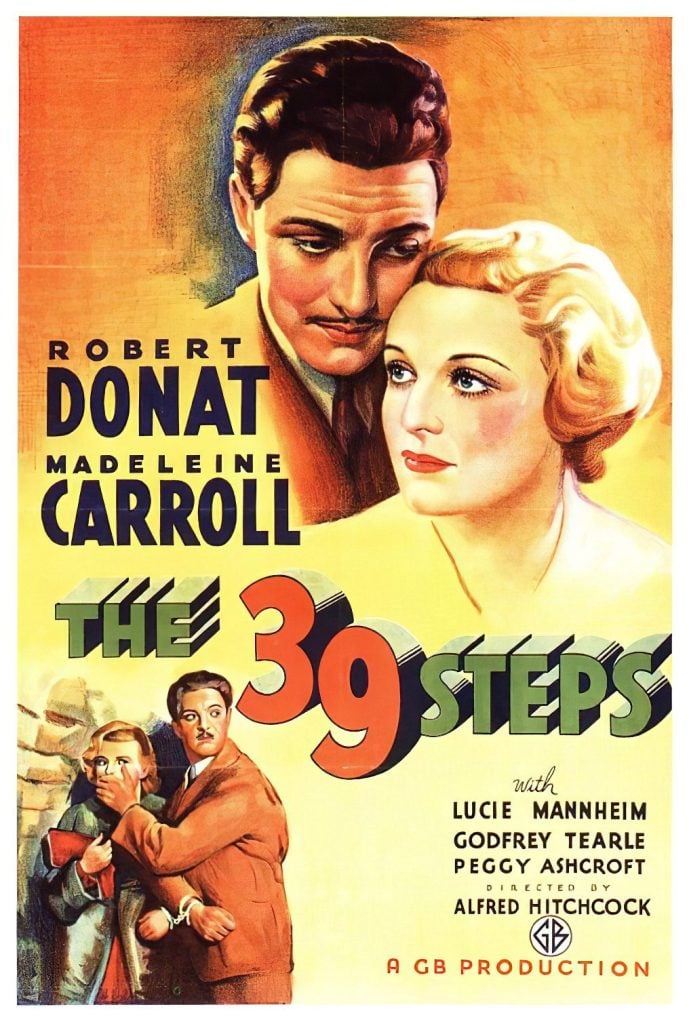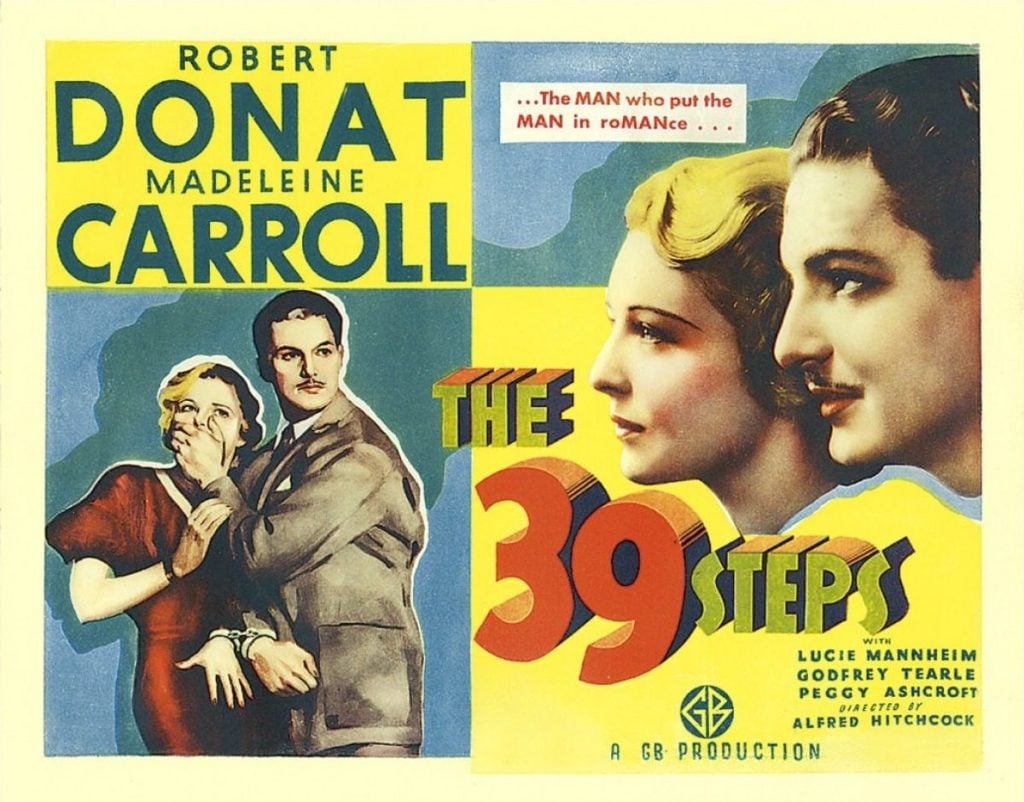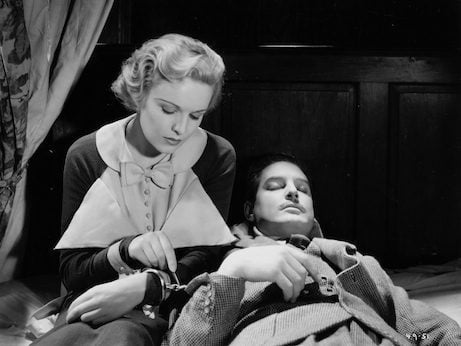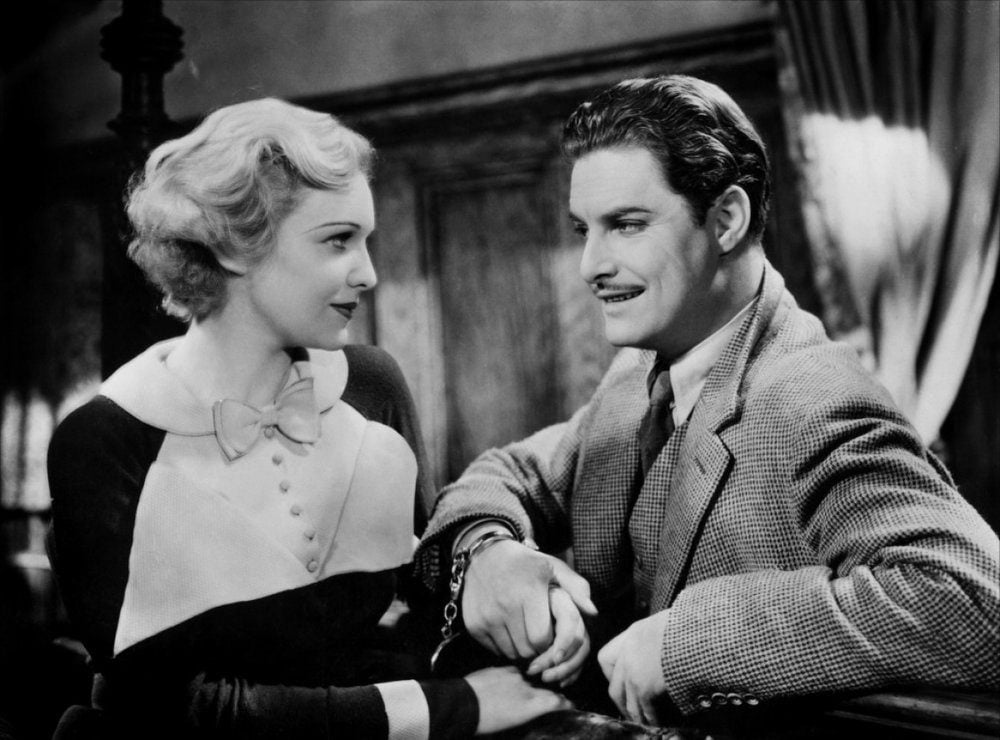- Details
- Directed by Alfred Hitchcock
- Screenplay by Charles Bennett, Ian Hay
- Based on The Thirty-Nine Steps by John Buchan (1915)
- Released on June 6 (UK), August 2 (US) 1935
- Running time 86 minutes.
- Cast Robert Donat, Madeleine Carroll, Lucie Mannheim, and Godfrey Tearle

The film opens in a packed theater located in London where a show is about to begin. The show is “Mr. Memory,” a man who commits 50 facts a day to memory and encourages the audience to yell out questions to him so that he may prove his talent. Richard Hannay (Robert Donat) is in attendance, asking questions about his homeland in Canada. While the show is still going on, a fight breaks out, and suddenly a shot rings through the crowd. The audience begins fleeing the theater, and Hannay finds himself holding a woman who seems to be shaken up.
The woman asks for him to take her back to his place, and once they arrive, she informs Hannay that she was the one who fired the shot. She says her name is Annabelle Smith, and she is a spy on the run who needed a distraction to escape. She tells him that she uncovered plans to steal British military information and says the phrase “The 39 Steps.” Later that night, while Hannay is in bed, Smith comes into his room for what looks like could be some intimacy. However, when Smith proclaims, “they’ll come for you next,” she falls over dead revealing a knife in her back. In her hands, she holds a map with a house in the Scottish Highlands circled.
Hannay decides to flee his apartment in disguise, so the killers outside do not end him next. He boards a train with plans to find the place on the map. While on the train, he discovers that he is wanted for the murder of Smith. He approaches an officer, seemingly to turn himself in and explain the situation, but hears the officer tell someone, “There is enough evidence to hang the man.” Now, fearing for his life, Hannay gets back on the train just as it pulls out of the station. The next thing he knows, the police are searching each car on the train looking for him. Hannay ducks into a train car, and to trick the authorities, he kisses the lone woman (Madeleine Caroll) in the car with him. The police enter anyway, and she tells them who Hannay is, forcing him to escape.
He makes his way to the house on the map where a large gathering is taking place. The police, who have been chasing him the entire time, follow him to the house. The owner, however, sends the law away, fooling them into thinking Hannay is not there. The owner, Mr. Jordan, sits down with Hannay after all the guests have left to listen to his story. When Hannay tells him everything, he also reveals that the spy’s leader is missing his little finger’s top joint. Jordan raises his hand to show that he is missing that join and shoots Hannay.
Hannay, however, was wearing an oversized coat with a book inside it, and the book stops the bullet saving his life. Deciding it is time to turn himself in, Hannay goes to the local sheriff, who he met at Jordan’s gathering. Unfortunately, the sheriff does not believe him and handcuffs Hannay. Again, having to flee for his life, Hannay jumps through a window to escape. He runs into a large meeting, and the people confuse him for being the speaker. He gets up in front of everyone and gives a grand speech but is recognized by the woman from the train car that he kissed, Pamela. Pamela goes straight to the police and turns him in.
As they take Hannay away, he begs Pamela to make some phone calls shedding light on the treason taking place. She refuses to do so, but the police say that she must come back to the station with them as well to help build a case against Hannay. The police handcuff Pamela to Hannay and leave but go in the wrong direction. At this moment, Hannay discovers these are not police at all, but members of the spy organization set on killing him.

He escapes again, but this time with Pamela handcuffed to him. She struggles to stay, but Hannay, fearing for his life, forces her to run off with him. Later that night, as Hannay is sleeping, Pamela slips the cuffs off her hand and sneaks out of the room. She then overhears a telephone conversation by the men chasing them, confirming they are spies.
The next day, Pamela, now believing Hannay’s story, heads back to London to inform the police only to be told no documents have been stolen, and she sent out not being believed. The law, however, follows her because they think now that she is going to lead them to Hannay. She enters a large theater that just so happens to be Mr. Memory’s show. Hannay is there, and the police grab him only as he sees Jordan. At that moment, Hannay understands that Mr. Memory memorized all the documents for Jordan and is going to flee the country with them. Hannay shouts out, “What are the 39 Steps?” to which Mr. Memory replies, “The 39 Steps is an organization of spies, collecting information on behalf of the Foreign Office off,” and then BAM, he is shot. Hannay, along with some police officers and Pamela, rushes to Mr. Memory. The latter is dying and has just enough life left to explain, in great detail, the design for a silent engine.
The 39 Steps was Alfred Hitchcock’s second break-out success, after The Man Who Knew Too Much. Hitchcock was giving a green light on almost any film he wanted to do because of this success. His approach to treating anxiety and fantasy together on the same screen and his directing skills were made history when the cast began explaining how he would get them into character. Hitchcock handcuffed Donat and Carroll together for hours before filming, telling them he lost the key. He did this for them to get an idea of what being trapped together would feel like in hopes that it would translate to the screen, which it did. The film was so good that while screening it with the author of the novel the film was loosely based on, Hitchcock leaned over and asked the author what he thought of the film. The response was, “it’s fantastic, I can’t wait to see how it ends.”
A true master of his craft, Hitchcock built something with this film that is still used in movies today, the idea of a wrongfully accused man with nowhere to go and no one to listen. Screenwriter and director Robert Towne are quoted as saying, “It’s not much pf an exaggerating to say that all contemporary escapist entertainment beings with The 39 Steps.”

Watch “The 39 Steps” on TheLastPicture.Show
Written exclusively for TheLastPicture.Show by Jacob Ruble
Disclosure: The links on this page are “Affiliate Links” and while these are shown at no costs to our viewers, they generate commissions for our website(s)

